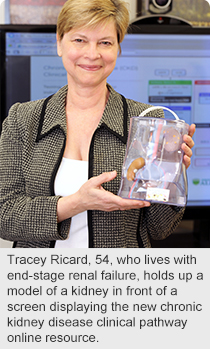
January 23, 2015
Story by Gregory Kennedy; photo by Dale MacMillan
EDMONTON — Living with end-stage renal failure can be a challenge but Tracey Ricard says she’s confident she’s getting the best of care from her family physician thanks to a new online resource from Alberta Health Services.
Albertans living with chronic kidney disease (CKD) are now receiving improved diagnosis and treatment following the launch of a standardized care pathway.
Developed by Alberta researchers, the CKD clinical pathway provides community physicians, pharmacists and nurses an online resource that can be used to shape care plans for the one-in-10 Alberta adults with chronic kidney disease.
 “I think this is a brilliant idea,” says Ricard, 54. “Giving family practitioners this tool and the ability to more positively identify renal issues is definitely a benefit.”
“I think this is a brilliant idea,” says Ricard, 54. “Giving family practitioners this tool and the ability to more positively identify renal issues is definitely a benefit.”
The Tofield-area resident has about 14 per cent kidney function due to sarcoidosis, an auto-immune system condition in which collections of inflammatory cells can damage organs.
“My diagnosis was tricky but they got it right,” says Ricard. “Personally, I have nothing but good things to say about Alberta Health Services.”
Dr. Kailash Jindal, Clinical Section Chief Renal for the Edmonton Zone of Alberta Health Services and Medical Lead for the Northern Alberta Renal Program (NARP), says: “There is currently a wide variation in how patients with chronic kidney disease are identified and treated.
“This tool improves access for patients by assisting primary care providers to manage patients with chronic kidney disease in the community, as well as helping to identify patients with more serious kidney disease and ensure they have timely access to a specialist.
“Clinical pathways like this one also help to standardize practice and ensure all patients in Alberta receive the highest quality, guideline-recommended care,” adds Dr. Jindal, who’s also Professor and Divisional Director of Nephrology at the University of Alberta.
Chronic kidney disease is a potentially fatal condition that can lead to a progressive loss of renal (kidney) function over time, resulting in a variety of health complications. Patients with high blood pressure, diabetes or a family history of kidney disease are at risk.
The pathway guides clinicians in testing and identifying patients with chronic kidney disease, managing the condition through lifestyle and medication and, in some cases, referring patients to specialists.
“Identifying and treating patients with chronic kidney disease can be a complex process,” says Edmonton family physician Dr. Nigel Flook, a clinical professor with the University of Alberta’s Department of Family Medicine, as well as Chief of Family Medicine and Women’s Health at the community-based University Hospital family medicine clinic.
“This tool provides clinicians with accessible information on diagnosis, testing, management and referral in a format that is simple to navigate and interpret. It also has excellent information to share with patients as they become empowered to manage their condition.”
The chronic kidney disease pathway was developed by the Interdisciplinary Chronic Disease Collaboration, a team of Alberta-based researchers, primary care physicians, pharmacists, nurses and nephrologists, and is aimed at improving the health of patients with non-communicable chronic diseases.
The pathway is based on best practice and evidence recommendations from a number of sources, including the Canadian Cardiovascular Society, the Canadian Diabetes Association and the Canadian Society of Nephrology.
Clinicians can visit ckdpathway.ca for more information.
“This new resource adds substantially to patient care,” says Dr. Jindal. “Now, many more of these patients with kidney disease can be identified by family physicians and managed closer to home; plus, it will make it easier for physicians to refer those patients who need to see a specialist sooner.”